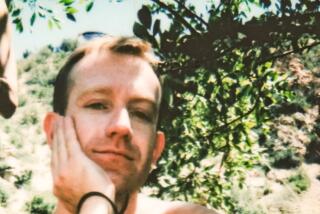For Brandt’s Family, ‘McCarthy’ Witch Hunts Real
- Share via
The specter of Victor Brandt playing Joe McCarthy is immediately ironic. In Jeff Goldsmith’s “McCarthy” (opening Saturday at the Odyssey Theatre) the actor puts himself squarely in the shoes of one of the least liked political figures of the 20th Century--a man whose Communist witch hunts devastated not only a country but Brandt’s own family.
In 1951, Brandt was 9 and living in Los Angeles. One day, two men identifying themselves as FBI agents knocked on the door. “I’d been brought up to believe that policemen were good,” he said, “but here were these men with the long overcoats and hats, looking down at me from the other side of the screen door with the most steely, ice-blue eyes I’d ever seen, saying, ‘Is your daddy home?’ ”
The agenda was clear: questions to the elder Brandt about people he knew, people who might be affiliated with the Communist Party. His father, a director and producer who’d been aligned with the Yiddish Theatre, the Federal Theatre Project and the Actors’ Lab informed the men that he’d have to contact his attorney before speaking with them. The agents left.
For a single episode, the repercussions were long-lasting. Although his parents were never blacklisted, “there was the agony of always waiting for it to happen.” And there were economic side effects. The elder Brandt later lost out on a contract at RKO Studios when he refused to sign a de rigueur loyalty oath--and gradually found himself reduced to lesser jobs within the profession.
In a child’s eyes, things changed too. People who testified against neighbors and spouses were “rats.” Suddenly you couldn’t play with their kids: “We’re not friends with them anymore.” But beyond that, few details were discussed. “How do you tell a 9-year-old about political activism or social justice or civil rights?” Brandt asked rhetorically. “When I told my mother that I was doing this play and might be talking about that time, she said, ‘Just don’t tell too much.’ I said, ‘Mom, I don’t know too much.’ ”
Now he does. Books and books of research have filled the actor’s home since he began working on the part a year ago. At one point, his teen-age daughter became curious, picked up a book, and did a report on McCarthy for school. “She asked me, ‘How did he get away with it?’ The fact is that circumstances helped this man along. We’d just come out of World War II, the Soviets had developed the bomb. The Rosenbergs had been sent to the electric chair for selling secrets to the Russians. All these things made it ripe for McCarthy. If it hadn’t been him, it would have been someone else.
“He was the quintessential ‘Everybody’s famous for 15 minutes.’ It was his moment in the sun and he took it. He also knew which button to push in the American public: the fear of communism--which is the fear of atheism. And anybody who’s godless has to be evil. He was John Wayne from Saturn, a war hero who was going to save America from the threat of communism. He used to say McCarthyism was Americanism with its sleeves rolled up. The truth is he never named a single Communist in his entire career. But thousands were affected. Hundreds lost their jobs.”
Brandt (who describes himself as a “local theater kind of guy”--credits include “Mary Barnes” and “Edmond” and “Mensch Meier” at the Odyssey) likens McCarthy to Shakepeare’s “Richard III.”
“When Richard--who was supposed to be an ugly, decrepit man--seduces Anne at the funeral of her husband he says, ‘I can do these things; I can change shapes.’ McCarthy did that,” Brandt said. “He was like a chameleon, becoming what he needed to be at the moment to take the advantage.
“He was a monster, a brilliant manipulator. He broke every rule in the book, and if he was attacked he would counterattack twice as hard: brutally, viciously. There’s no forgiving, feeling sorry for him. But I also found humor, charm, vulnerability. And I found something we had in common: being a risk-taker. Joe liked to push it to the edge--and I do too. My assignment was to find the Joe McCarthy in all of us. How did he make love? What were his fears? What was his agenda? Who was he really?”
In Goldsmith’s 17-character play (which combines different stylistic elements, including dialogue taken from transcripts from House Un-American Activities Committeehearings and nonlinear ruminations from McCarthy, “convincing us that he was a good guy”) we meet a man who would destroy a person on the floor of the Senate and then invite him to dinner; who announced that he had the name of 205 Communists, and the next day revised the body count to 57--with no explanation.”
For Brandt, doing this play is a means of righting emotional wrongs: not only is it a terrific acting assignment, but a way for him to make a political stand--and reach a perhaps less-informed generation: “This play isn’t about communism/anti-communism. It’s about, ‘We must be wary of people who play on our fears. We must question all authority.
More to Read
The biggest entertainment stories
Get our big stories about Hollywood, film, television, music, arts, culture and more right in your inbox as soon as they publish.
You may occasionally receive promotional content from the Los Angeles Times.










